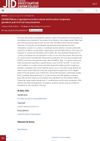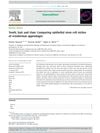Search
for
Sort by
Research
960-990 / 1000+ results
research Proteomic Analysis of Balding and Non-Balding Mesenchyme-Derived Dermal Papilla Cells from Androgenetic Alopecia Patients Using Online Two-Dimensional Reversed Phase-Reversed Phase LC-MS/MS
Found different proteins in balding and non-balding cells, giving insight into hair loss causes.

research Conditional Disruption of Hedgehog Signaling Pathway Defines Its Critical Role in Hair Development and Regeneration
The hedgehog signaling pathway is crucial for hair growth but not for the initial creation of hair follicles.

research The HPV16 Oncogenes Cause Aberrant Stem Cell Mobilization
HPV16 oncogenes disrupt the normal activity of hair follicle stem cells.

research Advances in Hair Diseases
The review highlights the importance of stem cells in hair health and suggests new treatment strategies for hair loss conditions.

research COX2-ATP Synthase Regulates Spine Follicle Size in Hedgehogs
COX2 and ATP synthase control the size of hedgehog spines.

research The Biology of Hair Growth
Hair growth is influenced by hormones and goes through different phases; androgens can both promote and inhibit hair growth depending on the body area.

research Androgens and Hair: A Biological Paradox with Clinical Consequences
Androgens can both increase body hair and cause scalp hair loss.

research Identification of the Cell Lineage at the Origin of Basal Cell Carcinoma
Basal cell carcinoma mostly starts from cells in the upper skin layers, not hair follicle stem cells.
research The Upper Dermal Sheath Has Potential to Regenerate Hair in Rat Follicular Epidermis
The upper dermal sheath can regenerate hair in rats.
research Feasibility of Repairing Full-Thickness Skin Defects by iPSC-Derived Epithelial Stem Cells Seeded on a Human Acellular Amniotic Membrane
iPSC-derived stem cells on a special membrane can help repair full-thickness skin defects.

research Effects of Ganoderma Lucidum Extract and Ganoderic Acid A on Hair Loss Prevention
Ganoderma lucidum extract and its component, ganoderic acid A, may effectively prevent hair loss.

research Platelet-Rich Plasma: Alopecia Areata and Autoimmune Destruction of the Hair
PRP is a promising treatment for autoimmune hair loss but its exact workings are not fully understood.

research Androgenic Alopecia: Cross-Talk Between Cell Signal Transduction Pathways
Hair loss in Androgenetic alopecia (AGA) is due to altered cell sensitivity to hormones, not increased hormone levels. Hair growth periods shorten over time, causing hair to become thinner and shorter. This is linked to miscommunication between cell pathways in hair follicles. There's also a change in gene expression related to blood vessels and cell growth in balding hair follicles. The exact molecular causes of AGA are still unclear.

research Melatonin Promotes Hair Regeneration by Modulating the Wnt/β-Catenin Signaling Pathway
Melatonin helps hair grow by activating a specific signaling pathway.

research Experimental and Early Investigational Drugs for Androgenetic Alopecia
New hair loss treatments may include topical medications, injections, and improved transplant methods.

research Epigenetic Regulations on Skin Wound Healing: Implications from Current Research
Epigenetic changes are crucial for stem cell behavior in skin wound healing and their disruption may lead to cancer.

research Stem Cell Dynamics, Migration, and Plasticity During Wound Healing
Stem cells help heal skin wounds by moving and changing roles, working with other cells, and needing more research on their activation and behavior.

research The CD44+ALDH+ Population of Human Keratinocytes Is Enriched for Epidermal Stem Cells with Long-Term Repopulating Ability
Certain human skin cells marked by CD44 and ALDH are rich in stem cells capable of long-term skin renewal.

research Establishment and Characterization of Matched Immortalized Human Frontal and Occipital Scalp Dermal Papilla Cell Lines from Androgenetic Alopecia
Scientists created cell lines from balding patients and found that cells from the front of the scalp are more affected by hormones that cause hair loss than those from the back.

research Hormonal Regulation of Hair Follicles Exhibits a Biological Paradox
Androgens can both stimulate and cause hair loss, and understanding their effects is key to treating hair disorders.

research Androgens and Hair Growth
Androgens can both increase and decrease hair growth in different parts of the body.

research The Involvement of Androgens in Human Hair Growth
Androgens play a key role in hair growth and disorders like baldness and excessive hairiness.

research The Effect of Oxygen Supply Using Perfluorocarbon-Based Nanoemulsions on Human Hair Growth
A new nanoemulsion increases oxygen for hair cells, leading to better hair growth.

research The Genetics of Hair Shaft Disorders
The article explains the genetic causes and symptoms of various hair disorders and highlights the need for more research to find treatments.

research Tooth, Hair, and Claw: Comparing Epithelial Stem Cell Niches of Ectodermal Appendages
The conclusion is that teeth, hair, and claws have similar stem cell niches, which are important for growth and repair, and more research is needed on their regulation and potential markers.

research Red Ginseng Extract Promotes Hair Growth in Cultured Human Hair Follicles
Red Ginseng Extract may help human hair grow by activating growth pathways and blocking negative effects of certain hormones.

research Androgenic Alopecia, Premature Graying, and Hair Thinning as Independent Predictors of Coronary Artery Disease in Young Asian Males
Early balding, premature graying, and hair thinning can predict heart disease in young Asian males.

research Utilizing Electromagnetic Radiation for Hair Growth
Low-Level Laser Therapy and other light treatments for hair growth lack strong evidence and need more research.

research Dihydrotestosterone-Inducible Dickkopf 1 from Balding Dermal Papilla Cells Causes Apoptosis in Follicular Keratinocytes
A substance called DKK-1 increases in balding areas and causes hair cells to die when exposed to DHT.